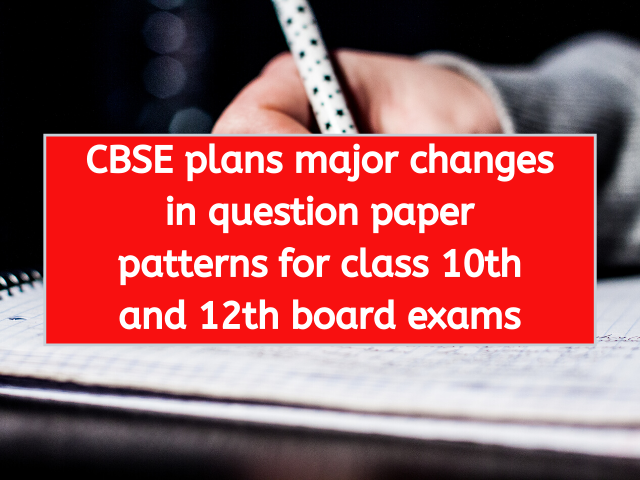The Central Board of Secondary Education (CBSE) would introduce major changes in the pattern of question papers for class X and XII by 2023 to boost creative, critical and analytical thinking among students.
Major changes in the exam pattern of question papers for class X and XII by 2023 is going to be implemented by the Central Board of Secondary Education (CBSE). This step has been taken to boost creative, critical and analytical thinking of the students.
It is the need of the hour keeping in mind country’s future, CBSE Secretary Anurag Tripathi said at the school education summit organised by the Associated Chambers of Commerce and Industry of India (ASSOCHAM).
He said, “While this year students of Class X will get 20% objective questions and 10% questions would be based on creative thinking, by 2023 question papers for classes X and XII will be based on creative, innovative and critical thinking.” Vocational subjects do not find many takers in India due to factors like lack of employability, poor value and absence of stability in the market, he said.
“There is also a need to promote proper linkages and bonding among key stakeholders in the schooling system including infrastructure, teachers, parents and students,” he added.
CBSE paper pattern changes:
- Question papers for classes 10th and 12th will be based on creative, innovative and critical thinking FROM 2023 onward.
- It will bridge the gap between vocational and main subjects.
- The vocational subjects will become the part of the five subjects.
- The board will also focus on different aspects like early childhood care, teacher training, promoting vocational education etc.
- The board is also implementing adaptive and project-based learning.
- The education system will follow children-centric methodology in the classroom.
- The board will introduce activity-based curriculum.
He suggested that schools must devote more time to teachers who need to be trained rigorously and be groomed for three to six months to become mentors, highly motivated communicator, expressive, have critical thinking and emotional balance.
- MCQ Questions for Class 10 Maths with Answers PDF Download
- Most Important MCQ Questions for Class 10 Science with Solutions for 2020 Board Exam
- CBSE Previous Year Question Papers for Class 10 and 12 Last 10 Years
- CBSE Class 10 Mid Term Exam Question Papers and Sample Papers
- Chemistry MCQs for CBSE Class 12 Chapter Wise with Answers Pdf Download
- How to ace the CBSE Class 10th and 12th Board Exams: Most Effective Preparation Tips to Score More than 90% Marks
- Physics MCQ for Class 12 Chapter wise with Answers PDF Download
- Maths MCQ for Class 12 Chapter wise with Answers PDF Download
- Biology MCQ for Class 12 Chapter wise with Answers PDF Download
- MCQ Questions for Class 10 Social Science with Answers PDF Download
Talking about the new education policy, he said it aims at bridging the gap between vocational and main subjects.” The new policy has recommended that vocational subjects need to be a part of the five subjects, it would be a good move. The NEP also focuses on different aspects like early childhood care, teacher training, promoting vocational education and thus, it would be a challenge to implement the same,” he said. His views were echoed by CBSE Director (Training and Skill Education) Biswajit Saha who said that schools in India need to focus on students’ capability and not employability, implement adaptive and project-based learning and follow children-centric methodology in the classroom.
“The flexibility in the system should be adapted in the curriculum transaction process to keep students’ mindset and what they need in mind. With respect to the common curriculum, whatever subjects are being offered, the room is very much there to introduce activity-based curriculum.
“If we want to really upgrade the system, then competency-based education needs to be implemented in the school systems which requires strong connect with the child,” he said.
Young students can shape up their career orientation only when they are not loaded with content-based curriculum. The flexibility in the system should be adapted by the school curriculum and the focus needs to be on activity based skill formation of students, he added.

